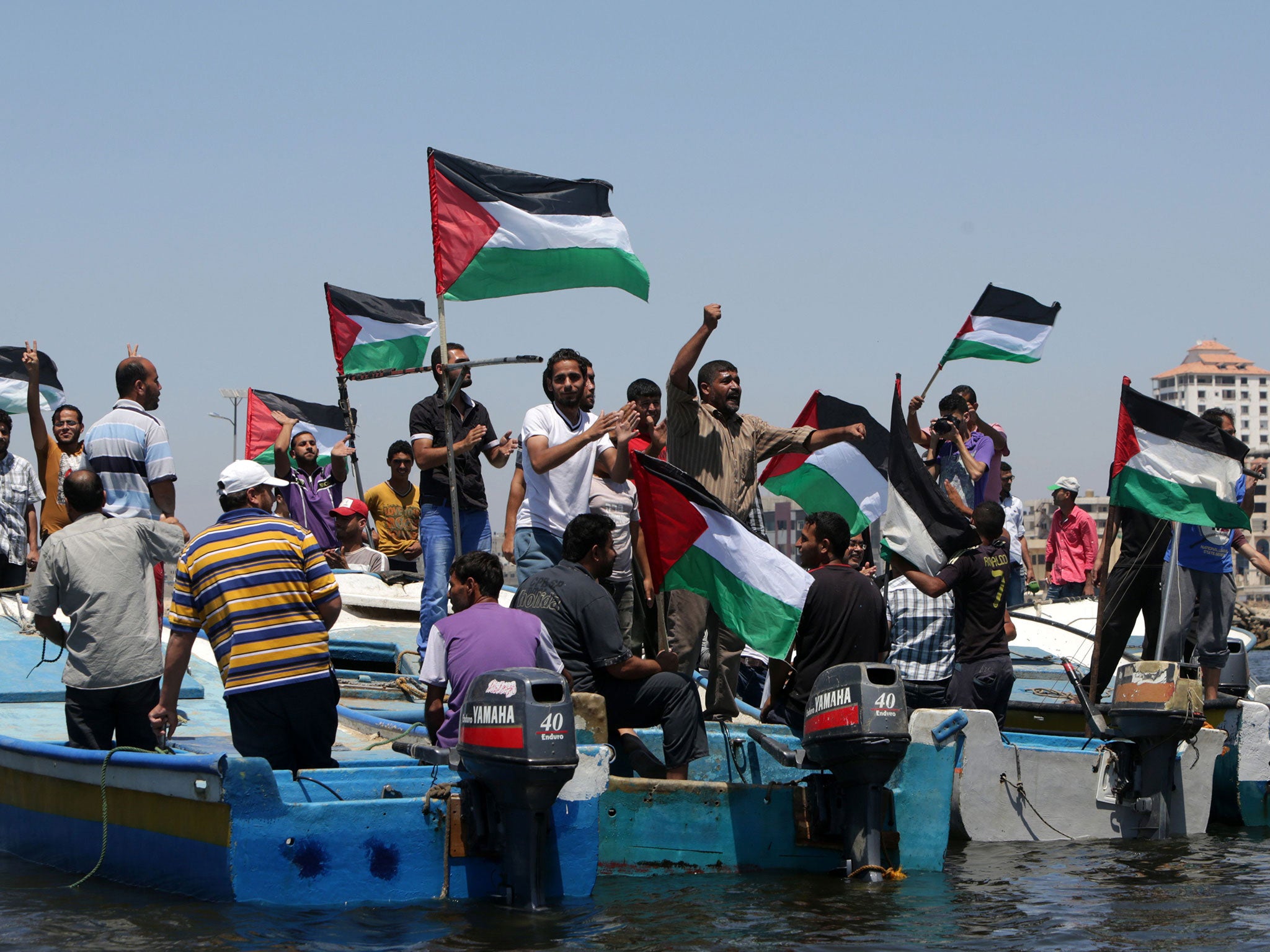Israel intercepts aid flotilla headed for Gaza - and the blockade is hurting Palestinian fishermen too
As Israel intercepts a flotilla, fishermen in Gaza City tell Sam Masters how the blockade stops them from making a living

The harbour walls are reinforced with rubble from buildings destroyed during Israel’s bombardment. Palestinian flags flutter in the breeze. The fishermen of Gaza City prepare to put out to sea.
The small fishing port, where many ships now remain idle, was the target for a humanitarian flotilla this week which hoped to sail past Israeli warships into the coastal enclave.
Instead, on Monday, the plans to breach the eight-year air and sea blockade into Gaza – introduced after Hamas’s rise to power – were foiled in what was described as “an act of state piracy in the Mediterranean sea” by activists.
The Marianne, carrying 20 campaigners including Israeli-Arab politicians Basel Ghattas and the former Tunisian President Moncef Marzouki, was peacefully seized by Israeli commandos. Other seizures of Gazan fishing boats that stray beyond the six-mile fishing limit are not so cordial. Gazan fishermen claim their boats are routinely fired on, the nets destroyed.
The Marianne was boarded and taken to the Israeli port of Ashdod. Israel’s Prime Minister, Benjamin Netanyahu, described the flotilla’s attempts to enter Gaza as “nothing but hypocrisy and lies” that would “only assist the Hamas terrorist organisation and ignores all of the horrors in our region”. He added: “We are not prepared to accept the entry of war material to the terrorist organisations in Gaza as has been done by sea in the past.”
A 2010 Israeli raid against a Gaza-bound flotilla left nine Turkish pro-Palestinian activists dead. It sparked international criticism of Israel and threatened its previously close ties with Turkey. Petros Stergiou, a member of the flotilla team in Athens, said the group would continue its acts of protest until the blockade of Gaza was lifted. “The government continues this policy, which means it will continue to enforce collective punishment against the 1.8 million people in Gaza.”
Three other boats are expected to attempt to dock in Gaza. Israel forbids Gaza to have an airport or seaport, except the small fishing harbour. Its warehouses have been reduced to rubble. Gaza fishermen are restricted to venturing no more than six nautical miles from shore. They say that leaves trawlers unable to cast their nets because the deeper waters are found further off the coast.
One such fisherman is Zyad. His boat, one of the smaller vessels docked at the port, is around 20ft and painted sky blue. Zyad repairs his green nets, cutting away ripped sections with a short knife.
Fishing is in the 47-year-old’s blood: his father and grandfather before him fished the same waters for sardines. For them, the catches were good, he says, and they at least had a fighting chance of success. He says 60 to 70 of Gaza’s fishing fleet have been destroyed in Israeli bombing raids. Across the water from the port is the beach where Palestinian children Mohammad Ramiz Bakr, 11, Ahed Atef Bakr and Zakariya Ahed Bakr, both 10, and Ismail Mahmoud Bakr, nine, were killed during Israeli shelling in last summer’s war.
Those who cannot put out to sea from the ramshackle port in Gaza City sit in the rubble of the fishing warehouses, repairing nets for others, for a small fee.
“Since I was 10 years old I have been fishing here,” says Zyad. “The situation is terrible. Before the first intifada, it was good. We were able to go out and reach beyond 20 nautical miles. Since then the Israelis have reduced the area where we can fish. We have struggled to catch anything. We can barely cover the costs of the fuel.”
He adds: “Sometimes the fishermen lose control of their nets and they go over the six-mile line. Then they are destroyed. Some are just desperate to catch something and try to go into deeper waters. They try their luck and the Israelis shoot at them. I have been shot at; we have all been. We are all desperate. In 2005 I was arrested with my son. They released me with my boat – this is very unusual. They told me it was their mistake and I had not crossed the six-mile line. If they hadn’t I would never have got my boat back.”
Fisherman say they have also been ordered to strip naked and swim to Israeli ships before their boats are seized.
Israel says the Gaza coast and ships could be used to smuggle weapons and rockets into the strip. But there was little sign of that as Zyad continued to repair his nets. “A fisherman in Gaza is like a fish in the sea,” he says. “This is in my blood.”
He adds: “It is the only thing I know how to do. I know people who have given up. But I will never do that. There is nothing for me on land.”
He says he had to buy a new boat after his last was destroyed by the Israeli navy in 2014. It cost 20,000 shekels (£3,360), he says. The new boat already appears worn. “Yesterday we made 500 shekels from our catch; the fuel cost 700,” he says. “It seems like there’s no point in going on. The sea is empty. We need to go out at least nine nautical miles to catch anything. Here there are so many people trying to catch no fish. I want to ask Israel to open the sea for us. We want access to the deeper waters. It is our right.”
Join our commenting forum
Join thought-provoking conversations, follow other Independent readers and see their replies
Comments